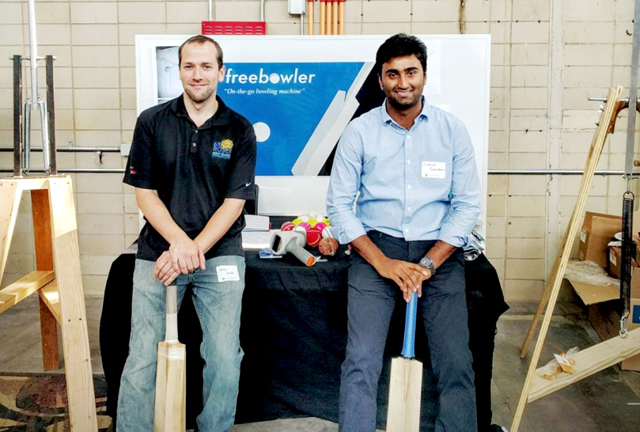
Justin Jacobs (left) and Pratheek Palanethra are the co-creators of Freebowler, a portable bowling machine capable of throwing real cricket balls. (courtesy photo)
By Colin McEvoy
Pratheek Palanethra has been playing cricket since he was four years old, and growing up in India, he never lacked in opportunities to play or practice.
But after moving to Bethlehem to attend Lehigh University, he found he’d often have to drive to New Jersey and spend upwards of $150 just for one hour of practice, losing half the day on traveling when he could be spending that time playing the game.
That’s why Palanethra, 24, and Justin Jacobs, 28, have teamed up to form the company Freebowler. Their first product, currently in development, is a portable bowling machine capable of throwing real cricket balls at 75 mph. The bowling machine is affordable, accessible, and convenient for everyday practice, and is suitable for teams and individuals alike.
“Cricket isn’t identified as a mainstream sport in the United States – not yet – and that’s part of our long-term vision,” Palanethra said. “We want to bring more awareness to the sport and help people learn about cricket, while also giving everyone access to the tools that can help them train like the pros.”
Freebowler, which started as an idea in Palanethra’s and Jacobs’ technical entrepreneurship course at Lehigh University, was recently awarded a $15,000 from the Southside Bethlehem Keystone Innovation Zone (KIZ), a designated zone within the city designed to foster entrepreneurial growth.
“We are extremely excited about the potential of FreeBowler,” said Asher Schiavone, Bethlehem economic development coordinator. “Their innovative product appears to satisfy a market demand, which hopefully is an indicator of the company’s future growth and success. I have, throughout the process, also learned quite a bit about the sport of cricket.”
Freebowler is unique in that it can be carried into the center of a cricket field and used as a convenient batting training aid. Most bowling machines are for top league professional teams, sports facilities, and recreation centers. They are non-mobile, cost thousands of dollars, and are not as accessible or convenient for individual cricketers and smaller teams.
Palanethra and Jacobs both graduated from Lehigh University’s Technical Entrepreneurship Master’s Program and currently reside at Hatch House, a live-work community for young or early stage entrepreneurs based in Bethlehem’s South Side.
Their product was previously accepted into Lehigh University’s LaunchBayC Student Idea Accelerator program, and has also been assisted by Northampton Community College’s Fab Lab. Jacobs said the many resources available to entrepreneurs and startups in the Lehigh Valley have been crucial to the development of Freebowler.
“If you look at the stories of some of the top entrepreneurs in the country, who started their companies from nothing, it’s very hard to do,” he said. “We’re doing the same thing, but it helps to have a little bit of extra incentive, and without the help we’ve gotten from the resources available in the Lehigh Valley, it would’ve been considerably more prohibitive.”
Palanethra started playing professional cricket at age 13, representing his region and playing for the R.V. College of Engerineering in Bengaluru, where he received his undergraduate degree in mechanical engineering. His cousin, K. L. Rahul, is a professional cricketer who plays for the Indian national team.
Jacobs, who received his undergraduate degree in industrial technology from Millersville University, only picked up the sport recently, and plays with Palanethra on the Lehigh Valley Cricket Club. The Freebowler product appealed to his engineering background, and Jacobs believes he brings an outside perspective to a cricket industry that often follows the status quo.
Technology transfer grants can go to a company located in the Southside Bethlehem KIZ that has been in operation for less than eight years and falls within a set of approved industry clusters. They are one of several incentives the KIZ provides to qualified businesses, which also include, student internship grants and KIZ tax credits.
Since its inception in 2004, the Southside Bethlehem KIZ has helped create more than 400 new jobs and facilitated over $6 million in investment to more than 90 eligible companies. That translates to about $75,000 of assistance per company.
Story courtesy of http://www.lehighvalley.org/ and can be found here.



